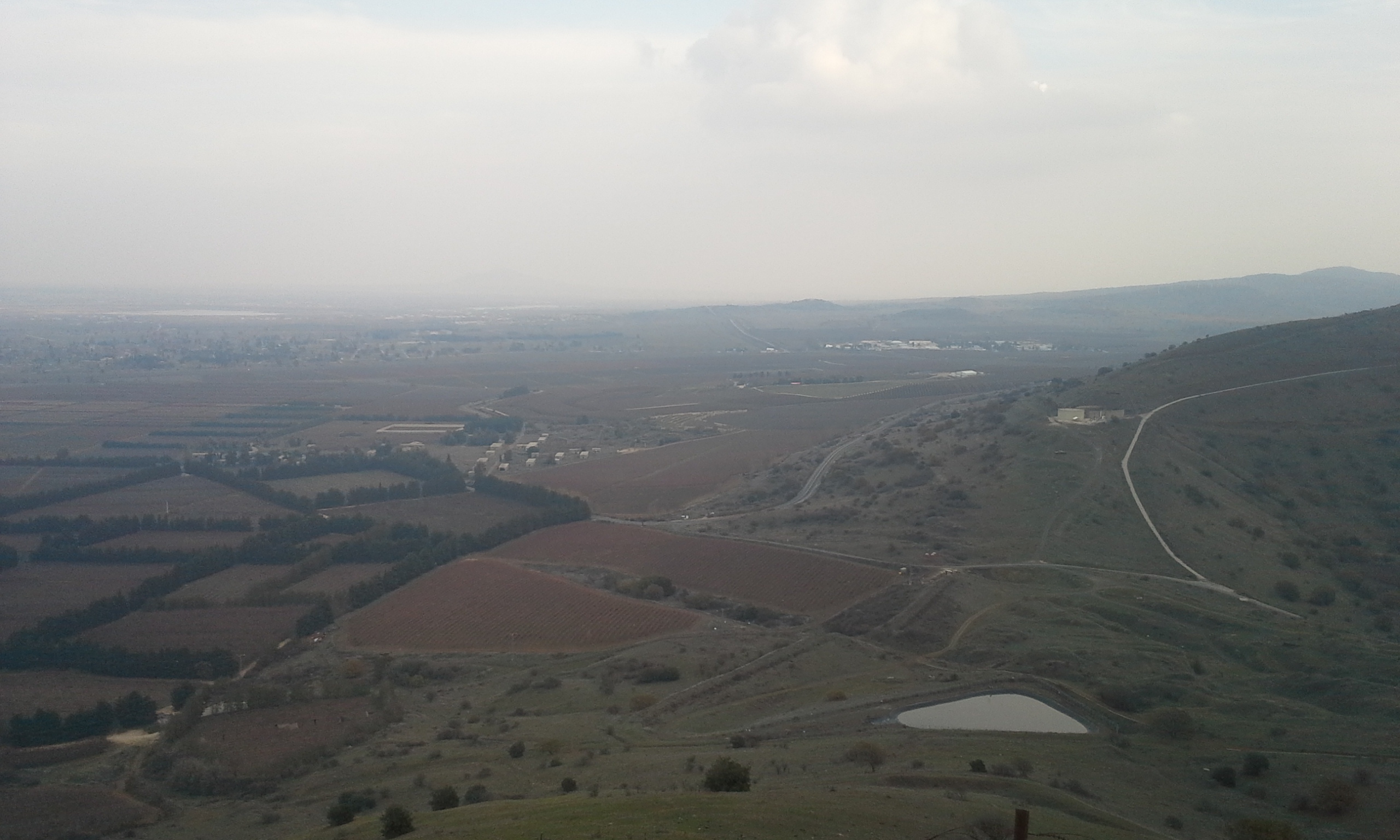Reflections on Counterterrorism After a Visit to the Israeli Borders with Syria and Egypt
Having participated last month in a trip facilitated by Academic Exchange and the Yitzhak Rabin Center, I have now had time to try to put some of what we heard and observed in context. The trip was an intense week of briefings from academics, journalists, current and former Israeli and Palestinian Authority officials, and other knowledgeable observers. As a corollary to discussions of the Israeli-Palestinian issue, the trip offered an opportunity to spend some time considering U.S.

Having participated last month in a trip facilitated by Academic Exchange and the Yitzhak Rabin Center, I have now had time to try to put some of what we heard and observed in context. The trip was an intense week of briefings from academics, journalists, current and former Israeli and Palestinian Authority officials, and other knowledgeable observers. As a corollary to discussions of the Israeli-Palestinian issue, the trip offered an opportunity to spend some time considering U.S. and international counterterrorism efforts against ISIS. At first, the two issues - defeating ISIS, and, renewing the stagnant Israeli-Palestinian peace process – may not appear to be interrelated. But considering ISIS from the perspective of its reach into territory not far from Israeli borders is worthwhile.
First, the geography. Israel is in close proximity to ISIS territory, fighting and terror on at least two fronts. ISIS is off of Israel’s northeastern border, actively engaged in hostilities and having staked out territory farther north in Syria. (This New York Times piece has useful maps of ISIS territory and battlefield engagement.) There are a large number of countries and groups active in Syria. By my estimation these include a combination of approximately a dozen major powers, regional nations, opposition forces, as well as independent and state-sponsored terrorist organizations that are operating in Syria openly (and, I presume, covertly). ISIS also operates off of Israel’s southern border in the Egyptian Sinai. As we now know, it was this ISIS faction that was responsible for murdering 224 civilians on a Russian airliner in October.
Meanwhile, the sliver of land known as Gaza is bordered by Israel to the east, the Mediterranean Sea to the west, and the Egyptian Sinai to the south. In 2006, Hamas won the Palestinian elections in Gaza, and has been responsible for governing that territory, since then. While on one hand ISIS and Hamas have reasons to logically line up on opposite sides of an issue or battlefield, there are reports suggesting that ISIS leaders located in the Sinai are communicating, cooperating and collaborating to some degree with Hamas. For a more detailed accounting of this development, readers may be interested in this report by Washington Institute Fellow Ehud Yaari. Some of the information provided in Yaari’s account was seconded by information we received during a visit to the Israeli border with Gaza last month. Despite the Egyptian government’s efforts to flood them with water and render them impassable, there are still functioning underground tunnels from Egypt into Gaza. A senior ISIS leader in the Sinai is known to have traveled through the tunnels into Gaza at least as recently as in early December. Most likely, the communication and cooperation concerns arms smuggling, which would serve Hamas’ interests by providing a method of obtaining arms, and serve ISIS’ interests by providing a revenue stream. That might be concerning enough, but given Hamas’ use of effective terrorist techniques for decades and ascent to its current role as governing entity, a worse development might be if we learn that Hamas is also providing training and advice to ISIS.
There is dissent within Hamas regarding whether and how much it should cooperate with ISIS, and rightly so: cooperation or collaboration with ISIS could lead to increased isolation of Hamas. To the extent that Hamas is viewed by some in the international community (not by the U.S., but by others) as a legitimate government, any affiliation with ISIS would only serve to degrade if not obliterate its reputation.
Similarly, any level of ISIS-Hamas cooperation could move stakeholders even further away (if that’s even possible at this point) from a constructive dialogue on negotiating a long-term Israeli-Palestinian peace. Judging by the dismal humanitarian condition in Gaza and the failure of Hamas to serve as a legitimate partner in discussions about improving the security situation emanating from Gaza, Hamas' record as a governing entity is not impressive. As a result, one wonders whether disillusionment with Hamas in Gaza might open the door of desperation to those who might buy into ISIS propaganda. More people in Gaza are unemployed than not. And because Hamas has been unable to stem the flow of terrorist activity (indeed, its charter calls for it) launched from its territory into Israeli neighborhoods and cities, Israel maintains a security choke-hold on the territory in the form of a great big wall and limited entry and exit points for pedestrians, goods and services. This is an unsustainable situation. (And yet, grand notions of peace talks aside, one that struck me, at least, as a humanitarian situation capable of being improved, if it were approached by the international community from that limited perspective.)
Moving east toward Jordan, the territory known as the West Bank is currently controlled, in part, by the Palestinian Authority. But our briefers – to a person, and regardless of their background, experience or affiliation – all suggested that the Palestinian Authority is on life support. Which raises perhaps not a near-term, but certainly a not-very-long-term, question of what Hamas or a Hamas-like government in the West Bank would mean for Israel unless the Palestinian Authority quickly creates space for legitimate next generation successors to ascend to leadership roles. To round out the geographic picture, Israel shares its border to the east with Jordan. According to Washington Institute International Fellow and former head of the Israeli Defense Force’s Strategic Planning Division, Michael Herzog, ISIS “…poses a direct threat to key Western ally Jordan – an essential anchor of stability and moderation…”
And yet, despite the presence of ISIS on both its northern and southern borders, and the arguably unstable governing bodies in the West Bank and Gaza, what I did not hear during our week in Israel, was, panic. Instead, while continually vigilant about its internal security, Israel remains focused on what it perceives as long-term strategic threats. This, despite the fact that as of mid-December, Israel had experienced roughly 130 individual or small-scale attacks by individual assailants in just 75 days. One wonders whether the current weapon of choice in many of these attacks - the knife – has traces of the influence of ISIS’ barbaric tactics. On the other hand, maybe guns are just harder to come by in Israel.
*****
Throughout the week we consistently heard a lament from a variety of perspectives regarding the perceived American disengagement in the region. One Israeli journalist summed up the common exasperation: “Americans are deserting the Middle East.” Over two years ago I wrote on Lawfare that “[i]t is in our interests to prevent radical Islamist terrorism from taking root in the Syria of the future” and offered several reasons why a more deliberate strategy to resolve the Syrian crisis was in the United States’ national interest. Probably over 200,000 Syrians have died since that post, What the 9/11 Commission Report Says About Syria, was written.
And yet, the notion that the U.S., by massive military force alone, will eliminate ISIS and restore peace to the broader region seems unlikely, given ISIS’ geographic spread and the escalating regional tensions, such as between Saudi Arabia and Iran. While the U.S. military is capable of destroying ISIS if overwhelming force were used (with accompanying civilian and American fatalities), the military mission must be accomplished with a significant coalition partnership. Then, stability in Syria and the surrounding region should be pursued in partnership with major as well as regional powers; particularly those that are capable of envisioning a future that offers security, human rights and economic opportunity for their citizens, even if that means reforming from within.
Perhaps the most persuasive of the briefings we received last month can be paraphrased as follows: The Middle East is undergoing a historic and sustained transformation. The post-colonial borders that were drawn by European powers to create modern day Iraq and Syria, for example, are crumbling, or, perhaps, have crumbled already. Our American and Western notions of nationality and statehood, are not readily accepted or applied in the current environment in the region. Instead, the region is reverting to regional, ethnic, tribal and religious divisions that have existed for centuries, if not millennia. Geographic borders, particularly in Iraq and Syria, remain to be sorted out, which will take time.
The challenge for America in the years ahead will not necessarily be in determining exactly what those borders are. The role for the next U.S. Administration will be far more complex, and far more challenging, than drawing lines in the sand. Instead, the American role will likely include leading, supporting and facilitating a cooperative military effort to ensure ISIS’ destruction; bolstering support for and cooperation with Jordan and Egypt in their counterterrorism efforts; helping to create an alternative narrative of opportunity to the way of life proposed by radical Islamist terrorism throughout the region; and facilitating the end of the Syrian civil war while taking necessary steps to prevent the physical territory that is now Syria from becoming a terrorist safe haven.
[Update: I have corrected a phrase to better capture the limited scope of Palestinian control over the West Bank. Thanks to astute readers for pointing out the issue.]





